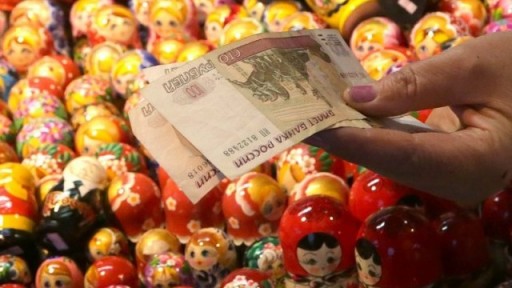- Home
- >
- >
- Bloomberg: Russian Toilets Used as a Hedge Against Ruble Rout Fallout

Bloomberg: Russian Toilets Used as a Hedge Against Ruble Rout Fallout

(Bloomberg) -- When the ruble plunged 37 percent in the first half of December, Kazakh businessman Marat Mukhamedov spotted an opportunity: Russian toilets. Realizing the urinals, tiles and other bathroom accessories he needed to stock the warehouse of his office-refurbishing company were now half the cost of six months earlier, he ordered twice the quantity required for the coming year to take advantage of the exchange rate.
“We spent the equivalent of about $200,000 to double our stock,” Mukhamedov, 37, said from his office at MZ Gesheft in the Kazakh city of Almaty where he’s project manager for the seven-year-old company employing around 50 people. “Now, we have a price advantage against some of the competition.”
At a time when President Vladimir Putin’s standoff with the West is slowing the economy and crimping sales at home, Kazakhs - the third biggest net buyers of Russian goods - are boosting orders to benefit from the 40 percent depreciation that’s made the ruble the worst-performing emerging-market currency of the past year. Purchases of rubles quadrupled in Kazakhstan in January from a year earlier to total 60 billion rubles ($1 billion) for the four months from October, according to data from Kazakhstan’s central bank in Almaty.
Russia’s currency rout is part of the reason inflation has spiraled to the highest since 2002. It’s also helping the economy by making Russian goods cheaper to people like Mukhamedov. Even the country’s oil export revenue has remained stable when converted back to rubles despite the 53 percent collapse of crude in dollars since last year.
Bargain-hunting Kazakhs and Belarusians bought about 90,000 of the 500,000 cars sold in Russia in November and December, according to data compiled by PriceWaterhouseCoopers. That’s almost half of the total 182,000 sold domestically in the two countries in all of 2014. Aziz Mamirov, the Almaty-based head of photography at Expert Kazakhstan magazine, said he bought a Volkswagen Jetta in Russia in February and saved at least $4,000 after his travel costs.
“I was asked by one dealership to wait as they will soon be bringing the cars they can’t sell in Kazakhstan to Moscow,” he said by phone on Thursday.
Gadgets are crossing the border too. One hundred kilometers from the Kazakh frontier, a unit of Media Markt, the German electronic retailer, has started taking orders online and delivering to Kazakh families. Its Russian stock of Samsung Electronics Co.’s Galaxy Alpha phones were $77 cheaper than in Kazakhstan, according to a price comparison March 13 by Bloomberg.
Chronopay.com, an Internet-payments operator, saw turnover from bank cards in former Soviet satellite states double in February compared with October, Denis Dunyushkin, the company’s spokesman in Moscow, said by e-mail March 4.
President Nursultan Nazarbayev appealed last month for citizens to “be patriotic and buy Kazakh goods.”
Yet demand for rubles is still rising in Kazakhstan, Moscow-based VTB Bank’s branch in Almaty said in a March 4 statement. Kazakhs bought almost 22 billion rubles in December and about 17 billion rubles in January, compared with 3.8 billion rubles in January 2014, according to the National Bank of Kazakhstan.
“Although the volume of ruble demand from the former Soviet republics isn’t enough to strengthen the currency, it helps to slow down the plunge,” said Anton Tabakh, a director of regional ratings at RusRating, a Moscow-based credit ratings company. The ruble has pared its losses of 2014, climbing 1 percent against the dollar for this year’s best performance among emerging-market currencies tracked by Bloomberg.
The cross-border boost for retailers won’t save Russia from a recession. Gross domestic product may shrink as much as 4 percent this year, the most since 2009, the central bank said March 13. Retail sales fell 7.7 percent in February, the most since 2009. Car purchases dropped 38 percent in Russia last month.
Heightened Kazakh demand for rubles and Russian goods may also prove short-lived. Russia’s ex-Soviet trading partners are under pressure to stay competitive by devaluing their own currencies. Ukraine’s hryvnia is the worst-performing currency this year amid the conflict with pro-Russian separatists and Belarus is next, sliding 26 percent against the dollar.
By contrast, the tenge is little changed since a 19 percent devaluation in February 2014. It’s costing Kazakhstan as much as $3 billion a month to keep the exchange rate at around 185 per dollar as falling oil prices and capital flight put pressure on the tenge, Moody’s Investors Service said in a March 5 report.
“To avoid foreign exchange risk, many participants prefer to act rather primitive, simply buying foreign currency assets,”Yerulan Mustafin, an Almaty-based analyst at Halyk Finance, said by e-mail on Thursday.
While Moody’s says a devaluation is unlikely before the country’s presidential election on April 26, futures traders are betting the exchange rate will weaken to 200 within three months and 231 by year-end, data compiled by Bloomberg show.
With depreciation looming, Russian toilets provided the perfect solution for Mukhamedov. “We are a little bit hedged against a possible tenge devaluation by being able to save money on the cost of materials for some time,” he said.
 Varchev Traders
Varchev Traders If you think, we can improve that section,
please comment. Your oppinion is imortant for us.






